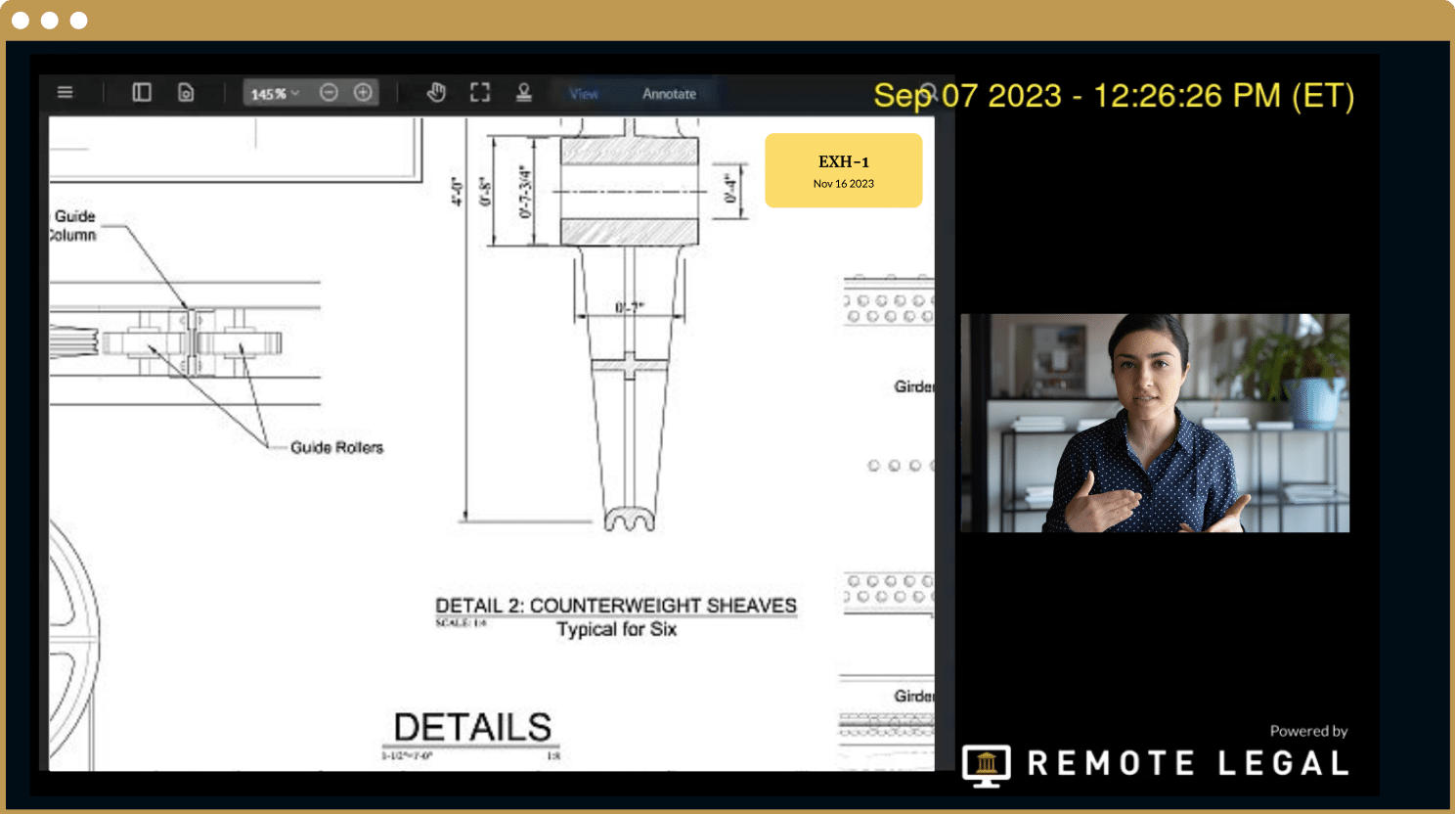Remote Legal vs. Zoom 
Which is better?
Remote Legal is a legal-first technology platform built specifically for depositions, arbitrations and mediations.

The Difference Remote Legal Makes
More convenient for all parties, resulting in fewer nonappearances and lower costs |
||
|---|---|---|
Accessible to invited parties via an emailed link |
||
Multiple people can join |
||
Private rooms available |
||
Multi-faceted court reportersRemote Legal includes a digital court reporter who serves as a court reporter, videographer, notary who manages the exhibits and swearing-in of witnesses, and tech expert for smooth and time-efficient proceedings. |
||
Streamlined exhibit handlingThe Remote Legal platform allows attorneys to privately and securely pre-upload exhibits or on the fly during deposition. |
||
Locally controlled exhibit sharingLawyers share only what they want everyone to see without the risk of revealing more than they intended. |
||
Error-proof breakout roomsWith a click, attorneys can secure virtual breakout rooms whenever needed. |
||
Full-size picture-in-picturePicture-in-picture capability enables participants to see a full-sized screen of the speaking witness, questioning attorney and exhibits at the same time. |
||
Unlimited storageThe platform automatically stores all exhibits, video or audio, and participant information for future reference. |
||
Video controlsRemote Legal captures witness-only video or offers audio-only recordings, each timestamped. |
||
Convenient live transcriptionParticipants can see the real-time transcription of the proceeding scrolling on the screen. |
||
Fast transcriptsAI generated rough drafts are available shortly after the end of the proceeding. |
||
Synchronized transcript-videoSearchable transcripts are automatically synced with the video without attorneys having to wait for a court reporter to finalize the preliminary transcript and the videographer to edit it. |
||
Easily accessible proceeding recordsDownloadable exhibits, summary, transcript and video are available shortly after the end of the proceeding. |
||
Official, trial-ready transcriptCertified legal video and transcript are considered an official record and trial-ready. |
1
Easily accessible proceeding records
Zoom is great for social gatherings or informal business meetings, but it was never created to serve the legal industry. It requires downloading an app as opposed to a truly native web-based experience. Features are lacking to conduct an efficient, secure, official proceeding, introducing risk and inefficiencies.
2
Zoom doesn’t provide a court reporter
Zoom is only a video conferencing platform, making it necessary to hire multiple people to conduct the proceeding, including a court reporter, notary, videographer, exhibit handler and technology monitor.
3
Zoom screen sharing isn’t ideal and even risky
You can screen share in Zoom, but it doesn’t offer a discreet exhibit sharing option. Lawyers must be hyper-vigilant not to inadvertently share other tabs or reveal case data.
4
No way to efficiently and securely manage exhibits
Exhibits are an essential part of a legal proceeding, but Zoom doesn’t have any built-in exhibit handling or direct exhibit annotation capabilities. Lawyers still must email documents to participants and find ways to make them part of the official record.
5
Breakout rooms aren’t convenient
While Zoom offers private breakout rooms, the platform requires a court reporter to stop what they’re doing to individually assign each participant a room. It's easy to make a mistake assigning people and rooms.
6
Zoom does not suit legal proceedings
Unless the lawyer hires multiple professionals, the presiding court reporter must manage privileges, files shared, and live screens while also serving as the court reporter, making it likely for proceeding delays or worse, things to be missed or mismanaged.
7
Access to transcripts can take days or even weeks
Zoom does not provide any automated transcription services, requiring a digital court reporter or stenographer to prepare, edit and make accessible the transcript over many days. And if a lawyer wants it synced with the video, it can take even longer and cost even more.
8
Video often not sufficient for trial
A Zoom recording isn’t appropriate for trial, with many courts not allowing them. If you want to use Zoom, you must also use a separate digital audio recording platform, which likely means you must also hire a separate legal videographer.
Choose Remote Legal
Everything you need for an efficient, professional legal proceeding is built into the Remote Legal platform. We make it not just convenient for you and witnesses to participate in a virtual deposition, mediation or arbitration, but we ensure it’s of the highest quality for the most in-person-like experience.
We invite you to learn more about this innovative, all-in-one legal platform.
